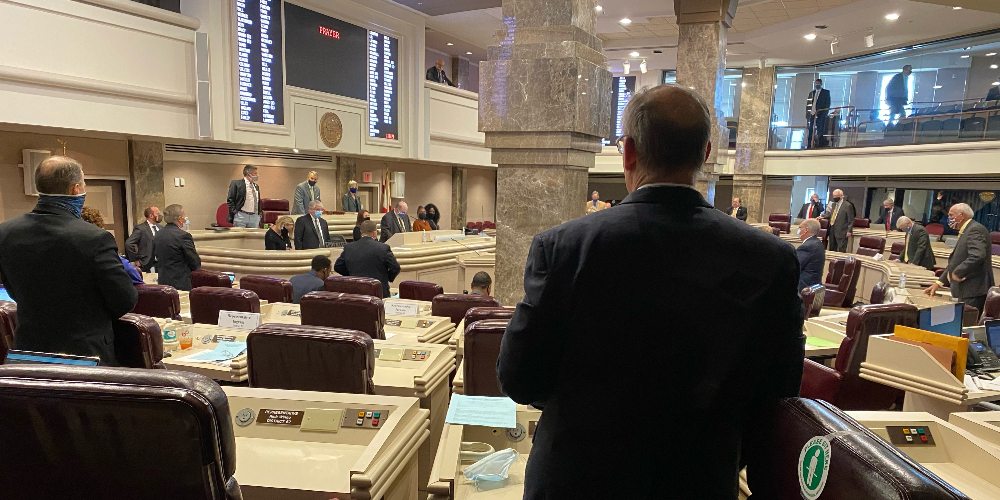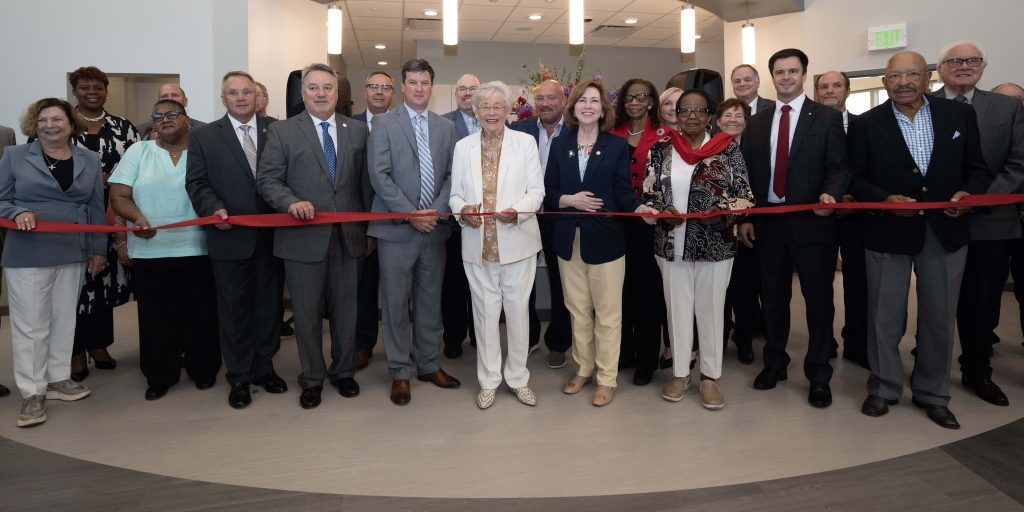MONTGOMERY — The Alabama House of Representatives on Tuesday passed a number of bills relating to law enforcement, including allowing state law enforcement to use wiretaps in drug trafficking cases.
Legislators also approved a measure that would require cities and counties to pay for PTSD treatments for their full-time police officers and firefighters, and passed a bill that would make those convicted of nonviolent felonies before the year 2013 eligible for resentencing.
The legislation allowing state investigators to use wiretaps in drug trafficking cases was brought by Rep. Rex Reynolds (R-Huntsville) in honor of the late officer Billy Clardy, who was killed in the line of duty in 2019. Reynolds is a former Huntsville police chief.
The bill, HB17, was co-sponsored by Reps. Andy Whitt (R-Harvest), Proncey Robertson (R-Trinity) and Shane Stringer (R-Satsuma).
Current Alabama law prevents law enforcement from using a wiretap in their investigations, though departments can work in tandem with federal agents who have access to wiretaps.
Reynolds said that HB17 gives state and local police agencies a “good tool” and emphasized that investigators would only be able to apply for one in felony drug cases.
Applications for wiretaps would go through the Alabama Attorney General’s Office, which would then submit applications to the relevant circuit court judge for the case. Both phone calls and written communications transmitted through the internet would be eligible for interception by law enforcement.
Reynolds’ wiretapping bill passed with 80 votes for and 14 votes against.
The House also passed on Tuesday HB24 sponsored by Rep. Jim Hill (R-Moody). The legislation would lead people convicted of nonviolent crimes prior to October of 2013 to be resentenced under the current sentence standards.
Hill said the bill would apply to “at most 1,000 individuals,” who would go back before the judge who sentenced them in the first place, or that judge’s replacement where applicable. Judges will be allowed to take into account the defendant’s behavior while in custody as part of the resentencing. The vote on HB24 was 63 in favor, 33 opposed.
Also sponsored by Rep. Hill, a former judge, HB109 passed the Alabama House on Tuesday. The bill would revise the compensation for retired judges and justices who are called out of retirement to help deal with caseloads.
Hill said such moves are often needed in Alabama, where many areas do not have enough judges to deal with the number of cases. The representative said this pre-existing problem had been made much worse during the coronavirus pandemic.
Rep. Matt Simpson (R-Daphne) sponsored HB212, which passed the House on Tuesday.
HB212 would require cities and counties to reimburse their police officers and firefighters for the insurance co-payments that come with treatment for post traumatic stress disorder.
The bill does not cover volunteer firefighters, which Simpson said could not be done because they are not insured through their service as firefighters, and the cost of forcing cities and counties to make those payments could not be estimated. He promised to revisit the issue in the future and expressed his appreciation for volunteer firefighters.
Simpson had a second bill he sponsored, HB 27, pass the House on Tuesday. It increases the severity of criminal penalties for those who commit home repair fraud in the wake of hurricanes or any event declared as a state of emergency by the governor.
The House also passed a number of more technical bills on Tuesday and a few with a more narrow scope of impact on the state. Those included the following:
HB 81 that makes more generous the method of how death benefits are calculated for the families of law enforcement officers.
HB 79 which tweaks police retirement policy.
HB 15 that provides a permanent disbursement of funds from the Dept. of Revenue to ALEA. The disbursement had been occurring annually since 2014.
HB 169 to update language and procedure regarding the Dept. of Labor’s responsibilities to mining reclamation projections and unemployment compensation.
HB 219 to extend the coal severance tax and change how excess funds from the tax are distributed.
HB 140 to clarify the language on how the state’s financial excise tax relates to credit unions.
HB 80 to provide subsistence pay to investigators in the Dept. of Revenue and the Dept. of Mental Health.
HB 116 to provide for a three-county audit of the upcoming 2022 general election paid for by federal funds procured by the Alabama Secretary of State’s office.
HB 188 that provides for a transfer of money between Dept. of Insurance’s Department Fund to the Strengthen Alabama Homes Fund.
HB 135 to allow Alabamians to purchase and own antique slot machines, which they are currently prevented from doing by anti-gambling laws. Only machines produced before 1960 would be eligible for ownership, and they could only be used in private homes or locations.
HB 165 to allow the Secretary of State to waive certain fees during times of declared states of emergency.
Many of these bills had been previously passed by the lower chamber in 2020 but did not receive final passage due to the COVID-19 pandemic shortening the session.
The Alabama House of Representatives will meet again at 1:00 p.m. on Wednesday, February 10.
Henry Thornton is a staff writer for Yellowhammer News. You can contact him by email: [email protected] or on Twitter @HenryThornton95.













